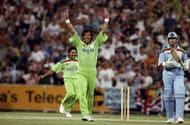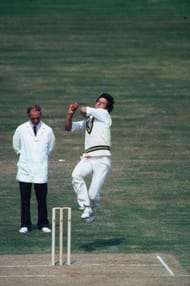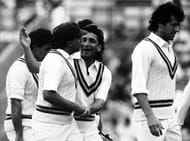In the Marxist school of thought, the world is divided into two parts: the bourgeoisie and the proletariat. The bourgeoisie consists of the exploitative rich middle class whereas the proletariat refers to working class people, who suffer at the hands of the former.
However, if Marx had remained alive to witness the life and times of former Pakistani skipper, Imran Khan, the legendary philosopher/economist would have faced a tough time in holding on to his sacrosanct segmentation of the society. The reason: Imran Khan, born and brought up like a bourgeois, was in every sense a proletarian hero. He was an Oxford-educated privileged man, who rallied cricketers from remotest corners of Pakistan and turned them into world beaters.
Imran was a great all-rounder in both forms of the game as evidenced by his overall tally of 7509 runs and 544 wickets in international cricket. With the ball, he was as lethal as Michael Holding and with the bat, he could be as dexterous as Martin Crowe. But, his greatest contribution to the game came as an enigmatic leader, who lifted Pakistan from the depths of mediocrity to World Cup glory in 1992.
Making of an all-rounder
Born in the family of an engineer on 5th October 1952 in Lahore, Imran belonged to the Niazi tribe. He had a pampered childhood being the only son in his family.
Khan received a privileged education. He was educated at Aitchison College in Lahore before he moved to Keble College, Oxford where he excelled in both studies and cricket.
In his early years, Imran played most of his first-class cricket in England. And his debut Test against England at Edgbaston in 1971 was quite ordinary as he went wicketless in both innings and could score only five runs in the only outing. In 1977, Tony Greig influenced him to join the Kerry Packer World Series Cricket, a rebel league in which he did pretty well, claiming 20 wickets in five matches and thus began his ascent in the annals of World Cricket.
Khan reached the peak of his career in the 80s, an era that saw the world of cricket being dominated by world class all-rounders such as; Ian Botham, Kapil Dev, and Sir Richard Hadlee. In 1982, Khan claimed 62 scalps from nine Tests at an astonishing average of 13.29 which is still the lowest average for a bowler with at least 50 wickets in a calendar year.
Format | Matches | Runs | Ave | 50/100 | Wickets | Ave | Economy | 5W/10W |
|---|---|---|---|---|---|---|---|---|
Tests | 88 | 3807 | 37.69 | 6/18 | 362 | 22.81 | 2.54 | 23/6 |
ODIS | 175 | 3709 | 33.41 | 1/19 | 182 | 26.61 | 3.89 | 1/0 |
Leadership role, Part I
The imposing all-rounder took over the captaincy baton from Javed Miandad in 1982. In no time, he emerged as a born leader of men and was able to help his teammates gel well in the way they never did previously. Using his knowledge of English condition to a great advantage, he led Pakistan to their maiden Test triumph in England after 28 years in his very second match as a captain.
Probably, the moment of his first part of captaincy role came in the year 1987 when he scripted Pakistan’s memorable 16-run victory over arch-rivals India in the fifth and final Test in Bangalore. That was Pakistan’s first ever series win on Indian soil.
In the same year, Pakistan also claimed their first series win in England with Imran conjuring up match-winning figures of 7/40 in the third Test at Headingley. Under his captaincy, Pakistan also earned three praiseworthy draws against the West Indies and reached the semi-finals of 1987 ODI World Cup following which he announced his retirement from the game.
Also read: SKipper: Shane Warne, the legacy you don't know
Leadership role, Part II

The burly Pathan came out of retirement to lead his team again in 1988 in the wake of a request from General Zia-Ul-Haq, the then president of the country. It was during his second stint of captaincy that Imran Khan’s name entered the folklore as an architect of Pakistan’s World Cup victory in 1992.
With only one win from five matches, Pakistan were on the verge of getting ousted from the 1992 ODI World Cup, which was jointly hosted by Australia and New Zealand. The team was in doldrums and players seemed divided. Imran then roused his men asking them to back up their talents and play every game as if it were the last game of their lives.
The players responded to their leader’s call and in what could be termed one of the greatest turnarounds in the history of professional sport, Pakistan pulled off an amazing comeback, beating Australia, Sri Lanka and New Zealand to sneak into the last-four. In the all-important semi-final against favourites New Zealand, young Inzamam-Ul-Haq rose to the occasion to give his side the unlikeliest of wins.
In the final against England, Imran top scored with a composed 72 off 110 balls to steer his side to a competitive 249/6. Later, he used his bowlers cleverly and inspired his teammates by invoking in them never-to-say-die spirit as Pakistan bowled out England for 227 to bag the crowning glory. Fittingly, it was Khan himself who claimed the last wicket of England’s innings to spark off wild celebrations.
Format | Matches | Wins | Losses | Draws | NR/Tie |
|---|---|---|---|---|---|
Tests | 48 | 14 | 8 | 26 | 0 |
ODIs | 139 | 77 | 57 | NA | 4/1 |
Legacy
Imran Khan’s greatest legacy lied in the way he inspired generations of fast bowlers from Pakistan to dream big and make a mark in the international arena. The two Ws, Wasim Akram and Waqar Younis, were his protégés who learned the skill of reverse swing under his tutelage. And later on, Shoaib Akhtar went on to publicly acknowledge that if he had played under Imran’s leadership, he would have finished his career with more than 400 Test wickets.
Imran is revered as a god-like figure in Pakistan. He is someone who commands respect from everyone in cricket fraternity. His off-field life has been equally exemplary. After his second and final retirement from the game, Khan set up the Shaukat Khanum Memorial Trust, a charity organisation named after his mother, and went on to build a chain of cancer hospitals in Lahore and Peshawar.
Imran Khan is now an active politician, who, at times, appears on sports channels as well to give his take on the happenings from the world of cricket. Even today at the age of 65, he possesses a formidable appearance and when he speaks, the erudition and the suaveness of an Oxford-educated man seem fully evident. Yet, his humility and determination to work for the well-being of underprivileged people underline his proletarian values. Marx may never figure out where to put Imran Khan in his segmentation of the class.
Also read: SKipper: Mohammad Rafique, the Tiger who never lost his hunger
Looking for fast live cricket scores? Download CricRocket and get fast score updates, top-notch commentary in-depth match stats & much more! 🚀☄️




